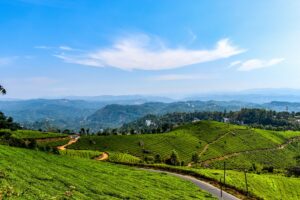Zanzibar, a jewel in the Indian Ocean, offers more than just pristine white-sand beaches and exotic spice markets—it is also one of the most sought-after destinations for scuba diving in East Africa. The island’s unique underwater ecosystem, warm waters, and vibrant coral reefs make Zanzibar scuba diving a once-in-a-lifetime experience. Whether you are a seasoned diver or an eager beginner, diving in Zanzibar opens the door to a world brimming with colorful marine life and breathtaking ocean landscapes.
In this article, we’ll dive deep (literally and figuratively) into why Zanzibar scuba diving has captured the hearts of divers from around the globe.
Why Choose Zanzibar for Scuba Diving?
There are many dive destinations around the world, but Zanzibar offers a rare mix of ideal diving conditions, biodiversity, and affordability. Here’s what makes Zanzibar scuba diving stand out:
-
Warm waters year-round (25°C to 29°C)
-
Excellent underwater visibility (15–30 meters)
-
Diverse marine life, including turtles, dolphins, reef sharks, and more
-
Over 30+ dive sites around the main island and its neighbors
-
Affordability compared to other luxury dive destinations
Best Zanzibar Scuba Diving Locations
Here are the top dive sites that are a must-visit for anyone exploring scuba diving in Zanzibar:
1. Mnemba Atoll
Located off the northeast coast, Mnemba Atoll is the crown jewel of Zanzibar diving. It’s surrounded by shallow reefs, making it suitable for all experience levels. Expect to see green sea turtles, pufferfish, moray eels, and dazzling coral gardens.
-
Depth range: 10–30 meters
-
Marine life: Turtles, clownfish, angelfish, barracudas
-
Ideal for: Beginners and photographers
2. Leven Bank
Situated north of Nungwi, Leven Bank is a deep-water reef only for experienced divers. It’s known for its open-water dives and strong currents, which bring in big pelagic species like kingfish, tuna, and occasionally, reef sharks.
-
Depth range: 18–40 meters
-
Marine life: Large fish, eagle rays, trevallies
-
Ideal for: Advanced divers seeking thrills
3. Pemba Island
Although a bit farther from the main island, Pemba is a diver’s paradise with untouched coral reefs and stunning wall dives. This remote area offers an uncrowded and immersive dive experience.
-
Depth range: 15–40+ meters
-
Marine life: Macro creatures, sharks, and rich coral cover
-
Ideal for: Explorers and underwater photographers
4. Kizimkazi
Located in the south, Kizimkazi is famous for its dolphin pods and unique reef structures. If you’re lucky, you might even spot a humpback whale during migration season.
-
Depth range: 10–25 meters
-
Marine life: Dolphins, parrotfish, soft coral
-
Ideal for: Drift diving and dolphin enthusiasts
5. Stone Town Wreck Dives
Just off Stone Town’s coast lie several old wrecks that have become artificial reefs. These are ideal for divers who enjoy underwater history and exploring mysterious sunken vessels.
-
Depth range: 8–20 meters
-
Marine life: Lionfish, groupers, nudibranchs
-
Ideal for: Intermediate divers and wreck lovers
Types of Marine Life in Zanzibar
Zanzibar scuba diving is known for its incredible biodiversity. Here’s a glimpse of what’s waiting beneath the waves:
-
Coral reefs: Hard and soft corals create colorful underwater landscapes.
-
Turtles: Green turtles and hawksbill turtles are common, especially near Mnemba.
-
Dolphins: Seen frequently near Kizimkazi and sometimes around Mnemba.
-
Reef sharks: Occasionally spotted in deeper dive sites like Leven Bank.
-
Macro life: Nudibranchs, pipefish, and leaf fish ideal for photography.
When is the Best Time to Dive in Zanzibar?
Zanzibar is a year-round dive destination, but some months are better than others:
-
Best seasons:
-
June to October – Cool and dry, great visibility.
-
December to March – Warm, calm seas, perfect for beginners.
-
-
Avoid:
-
April–May – Long rainy season, rough seas.
-
November – Short rains, may affect visibility.
-
Zanzibar Scuba Diving for Beginners
You don’t need to be certified to enjoy scuba diving in Zanzibar. Many dive centers offer introductory experiences like Discover Scuba Diving (DSD) where you get basic training followed by a supervised dive.
You can also get certified with:
-
PADI Open Water Diver Course
-
SSI Open Water Diver Course
Courses typically take 3–4 days and include theory sessions, confined water practice, and open-water dives.
Equipment and Safety
Zanzibar dive shops offer modern, well-maintained equipment, and most packages include full gear rental. However, if you have your own mask or dive computer, it’s a good idea to bring them.
Safety tips:
-
Always dive with a certified instructor or guide.
-
Follow surface interval and depth limit guidelines.
-
Stay hydrated and well-rested before diving.
-
Use reef-safe sunscreen.
-
Avoid touching coral or marine life to preserve the ecosystem.
Costs of Zanzibar Scuba Diving
One of the biggest advantages of diving in Zanzibar is affordability. Prices vary slightly between operators and locations:
-
1 Fun Dive: $40–$60
-
2-Tank Dive (most common): $90–$130
-
Discover Scuba Diving: $70–$100
-
Open Water Certification: $350–$450
-
Advanced Courses: $300+
Some resorts offer packages that include accommodation and multiple dives.
Top Zanzibar Scuba Diving Centers
To ensure a safe and enjoyable experience, choose dive centers with certified instructors and good customer reviews:
-
One Ocean Dive Center – Well-known and professional.
-
Spanish Dancer Divers – Popular in Nungwi.
-
Dive Point Zanzibar – Great service and newer gear.
-
Scubafish Zanzibar – Perfect for small-group dives.
-
Buccaneer Diving – Based in Paje, eco-conscious and reliable.
Sustainable Diving in Zanzibar
With tourism increasing, protecting Zanzibar’s delicate marine ecosystem is more important than ever. As a diver, you can contribute by:
-
Choosing dive centers that follow eco-friendly practices.
-
Never touching or standing on coral reefs.
-
Avoiding single-use plastics during your trip.
-
Supporting marine conservation organizations.
Organizations like Marine Cultures and Zanzibar Nature Conservation are actively involved in reef preservation and offer volunteer opportunities for eco-conscious travelers.
Final Thoughts
Zanzibar scuba diving is more than just an underwater activity—it’s an unforgettable experience that combines natural beauty, exciting marine life, and cultural richness. Whether you’re gliding over coral gardens in Mnemba or descending into the deep currents of Leven Bank, every dive in Zanzibar feels like discovering a secret world.
With welcoming dive centers, year-round warm waters, and endless sites to explore, Zanzibar truly earns its place as one of the world’s top scuba diving destinations. So grab your fins, take a deep breath, and prepare to fall in love with the underwater magic of Zanzibar.



